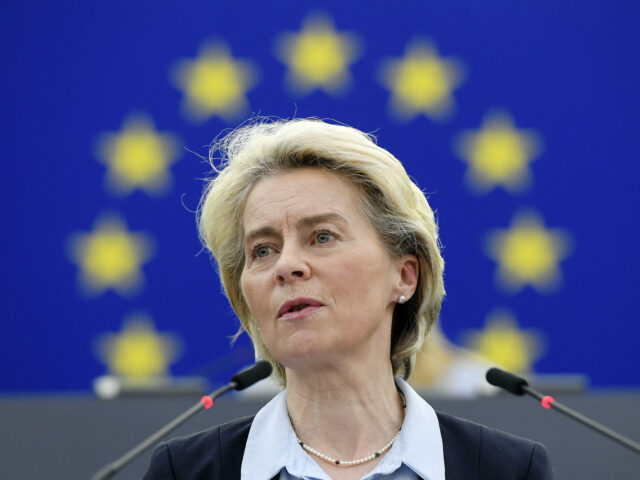Ursula von der Leyen has thrown her hat into the ring to seek another five-year term as the top official in the European Union, despite her first term being marred by the war in Ukraine, coronavirus authoritarianism, and widespread uprisings against her globalist green agenda.
During a meeting in Berlin with members of the federal executive board of the centrist Christian Democratic Union (CDU), Ursula von der Leyen told party leadership of her intentions to seek a second term as President of the European Commission, German broadcaster NTV reports.
The German politician will have to wait until after the European Parliament elections in June to officially file to stay on at the helm of the powerful executive branch of the EU. Following the elections, a candidate for the post will be put before the parliament for a vote by the parliamentary group that secured the most votes in the elections. According to current projections, the European People’s Party (EPP) Group to which von der Leyen belongs is expected to maintain its position as the largest bloc within the parliament.
While the EPP will almost assuredly back her nomination, it is not a foregone conclusion that von der Leyen gain enough votes from other groups within the parliament to secure a second term.
In 2019, the acolyte of former German Chancellor Angela Merkle barely passed the threshold by a margin of nine votes in the then 751-seat parliament, with groups from her home country of Germany refusing to back her candidacy over her scandal-ridden tenure as German Defence Minister, which was also heavily criticised for leaving the German military in “catastrophic” condition.
Nevertheless, she was ultimately installed with the backing of neo-liberal leaders from other European countries such as French President Emmanuel Macron who praised von der Leyen at the time for having “the DNA of the European community”.
Indeed, the German-heritage politician was born and raised in Brussels where she attended an elite ‘European School’ founded by forerunners of the EU to educate the children of diplomats and civil servants. Von Der Leyen’s father, Ernst Albrecht was one of the first European civil servants and helped establish the European Commission she now runs in 1958. Cementing her upper class status, she went on to marry into the elite German silk merchant von der Leyen family with her wedding to Heiko von der Leyen in 1986.
WEF: EU Chief Von Der Leyen Demands Censorship of ‘Industrial Scale Disinformation’ at Davoshttps://t.co/gOgXjTfVeq
— Breitbart London (@BreitbartLondon) January 17, 2024
Notwithstanding her status as the clear frontrunner for the next European Commission chief and the fawning praise from legacy media, with Forbes branding her as the most powerful woman in the world in both 2022 and 2023, von der Leyen’s first term has been one defined by chaos on multiple fronts and increasing authoritarianism.
During the Chinese coronavirus crisis, which befell the world one year after she took office in Brussels, the EU chief was one of the leading voices globally for lockdowns, mandatory coronavirus vaccinations, as well as being at the forefront of the push for Covid passports.
Regardless of the virus largely subsiding, she has continued her push to introduce a global health system, with the World Health Organization announcing last year that it would adopt the European Commission’s digital COVID-19 certification as the basis for its own system for “ongoing and future health threats”.
Under her leadership the EU also used the coronavirus crisis as one of its justifications for instituting even more stringent censorship measures, implementing the Digital Services Act (DSA) last year to crack down on so-called disinformation and hate speech online.
EU Has Gone ‘Power Mad’ over Covid Restrictions, ‘Thank Goodness We Left’, Says Farage https://t.co/qmdljhXXHs
— Breitbart London (@BreitbartLondon) December 3, 2021
Following the calamity of the coronavirus lockdowns, which sparked massive inflation throughout Europe, the economic situation of the bloc went from bad to worse as war broke out on its doorstep after Russia invaded Ukraine in February of 2022. EU Foreign Affairs Chief Josep Borrell admitted months later in October that Brussels was caught completely flat-footed by the invasion, saying that Brussels “did not believe that the war was coming” and that leadership was “quite reluctant to believe it.”
The war in Ukraine exposed the fundamental weaknesses of the EU’s reliance Russian gas and oil to prop up its green agenda, warnings over which from former President Donald Trump were largely ignored by von der Leyen and others.
Despite spiralling into a full-blown energy crisis following the sabotage of the Nord Stream pipelines from Russia to Germany, the EU chief declared last week that the bloc’s response should be to double down on so-called green energy sources such as wind and solar rather than following the far more successful and reliable fracking model adopted by the United States.
With the ascendance of right-wing populist parties, who are expected to make significant gains in the European Parliament elections in June, von der Leyen may be forced to moderate her green goals.
The rise of the populist parties comes largely over public resentment over the open borders agenda favoured by von der Leyen and her former boss Angela Merkel. However, the populist parties have also aligned themselves with the mass uprisings of farmers throughout Europe in response to the massive amounts of green regulations imposed upon them during von der Leyen’s first term.
The protests over the past month, which have seen farmers take to their tractors and shut down major motorways and clog up capital cities, has already forced von der Leyen to walk back some green initiatives, such as scrapping anti-meat propaganda, but it appears that farming groups appear intent to continue to put pressure on Brussels during the election season and potentially beyond.
Thousands of Farmers Blockade Brussels During EU Summit, Orbán Joins Farmers, ‘New Leaders’ Needed https://t.co/gbsgzs7zZd
— Breitbart London (@BreitbartLondon) February 2, 2024

COMMENTS
Please let us know if you're having issues with commenting.